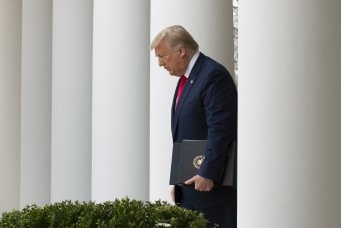Energy Is America’s New Power
Is the United States wisely taking advantage of its recent energy boom?
Windfall: How the New Energy Abundance Upends Global Politics and Strengthens America’s Power. By Meghan L. O’Sullivan. Simon & Schuster, New York, 2017. 496 pp.
When the Donald Trump administration released its National Security Strategy in December 2017, it celebrated the arrival of the United States as an energy-dominant world power. The production and export of U.S. oil and natural gas were a departure from previous decades, in which fears over scarcity and import dependency drove much of the country’s involvement in turbulent regions, most notably the Middle East. The new energy abundance, by contrast, puts the United States in an enviable geopolitical position. The report, which outlines America’s security concerns to Congress, explicitly states: “As a growing supplier of energy resources, technologies, and services around the world, the United States will help our allies and partners become more resilient against those that use energy to coerce.”
The prevalence of energy in a security strategy would not come as a surprise to Meghan O’Sullivan, former Deputy National Security Advisor to President George W. Bush for Iraq and Afghanistan, whose new book Windfall: How the New Energy Abundance Upends Global Politics and Strengthens America’s Power charts how U.S. oil and gas production has and will continue to recast geopolitics in the years to come. At a time when U.S. influence seems to be eroding abroad, accelerated by a mix of long- and short-term factors including the current U.S. President’s approach to diplomacy, energy remains a space where the country still maintains significant advantages. As O’Sullivan describes, U.S. energy abundance provides a range of opportunities, if Washington is smart enough to seize them.
The story of how that abundance came about is an all-American one. It arose out of the exploration and production of what is called tight oil—oil that is buried under shale rock formations that, for decades, had been technologically and economically hard for companies to extract. The 1973 Arab oil embargo, imposed by the Organization of the Petroleum Exporting Countries (OPEC) to punish countries supporting Israel during and after the Yom Kippur War, galvanized efforts by its victims to explore alternatives to Middle Eastern imports. A beneficial investment environment, aided by technological improvements and generous provision of royalties to private property owners, provided the perfect storm for the tight oil renaissance in the early 2010s.
The effects of that confluence of factors shook the energy world. Breaking the Arab monopoly on oil led to the rise of the United States as an oil and natural gas exporter, which not only had numerous benefits for the United States, but also contributed to greater energy security for the rest of the world. It has given the United States the power to compete with foreign countries using energy to coerce its allies and partners—a point that in the National Security Strategy is directed at Russia, which has, in the past, cut off natural gas supplies to Eastern European states for political reasons. O’Sullivan cautions the administration though, stating that the low oil price environment will not completely erase Russia’s desire to projects its power over its near-abroad (Ukraine and the Baltic States) or the Middle East. Greater energy abundance, however, does give the United States an important economic tool to push back against coercion by rival powers.
For OPEC members, the new abundance represents a challenge, as consistently high U.S. production levels have, along with other factors, kept crude oil prices at persistent lows. While many Middle Eastern producers have large surpluses to ride out the storm, many others in the cartel do not. For every Saudi Arabia who can rely on drawing down funds for government revenue from a sovereign wealth fund, there is a Nigeria who is facing risks to regime survival. As O’Sullivan notes, resource curses take their toll when states who rode a wave of rents from natural resources find the money flow cut off.
Venezuela is one prominent example. It was already hard to manage with oil prices high. When they dropped, it pushed the country to the brink of collapse. In no other country have the dynamics of energy markets caused so much direct political and economic strife.
Even for an energy power like Saudi Arabia, this is a challenging time. O’Sullivan’s book went to press before Crown Prince Mohammed Bin Salman’s crackdown on corruption, which included the arrest of dozens of the kingdom’s richest men. The move was widely interpreted as a consolidation of power as the crown prince embarks on an economic modernization program designed to diversify his country’s economy. The low oil price environment is a critical contributing factor to the need for this plan and Prince Mohammed seems to have concluded that the future prosperity of his country cannot rely on a price rebound alone.
For consumer states like China, the reverse is true. What had been a difficult geopolitical situation is now made comparatively calmer. In the mid-2000s, the hallmark of Chinese foreign policy was building strong relationships with countries like Sudan, who were pariahs to the rest of the international community but could reliably sell Beijing oil. With the new global energy abundance, however, China feels that it can purchase the oil it needs through a smoothly operating and well-supplied free market. Beijing seems particularly encouraged that the United States is invested in being an oil and natural gas exporter to China. O’Sullivan suggests that this could provide the foundation for further U.S.-China energy cooperation, with energy potentially bringing two geopolitical competitors closer together.
If Windfall has a weakness, it is something that is well beyond O’Sullivan’s control. The book was going to press as Trump’s administration was still in its early months. Consequently, it has missed the extent to which his “America First” campaign rhetoric has been translated into actual policy. In particular, its energy and climate change policies have only recently come into full focus. Thus, the book could not predict the full scale of Trump’s current hollowing out of the country’s diplomatic corps, or the extent to which his administration has undermined environmental protection regulation. The energy abundance O’Sullivan describes is ramping up at a time when the instruments the United States needs to fully exploit it are rapidly dwindling.
Thus, while O’Sullivan rightly calls for greater attention and activity by the United States on climate change, the administration has announced its intention to withdraw from the Paris Agreement, undermining a multilateral initiative that enjoys support worldwide. To date, it has not articulated how to re-engage with international climate change governance in a way that its allies and partners find credible. O’Sullivan sees an opportunity to tightly incorporate energy into the North American Free Trade Agreement (NAFTA), as Canada, Mexico, and the United States actively trade oil and gas. Trump’s trade rhetoric has threatened that integration, potentially capsizing NAFTA’s renegotiation. O’Sullivan’s vision of energy leadership embraces multilateralism, free trade, and cooperation with allies. To date, Trump’s approach to foreign policy has veered to the opposite direction.
Whether President Trump’s current policy trajectory is reversible will depend ultimately on whether the political complexion of Congress changes, and if he himself is ultimately reelected in 2020. In the meantime, he seems likely to continue to impose strategic and economic damage, not just in energy. The ability to harness America’s new energy abundance may ultimately have to await a commander-in-chief who sees more clearly an active international role for the United States in the same way that O’Sullivan does.
Neil Bhatiya is research associate for the Energy, Economics, and Security Program at the Center for a New American Security. On Twitter: @NeilBhatiya.





